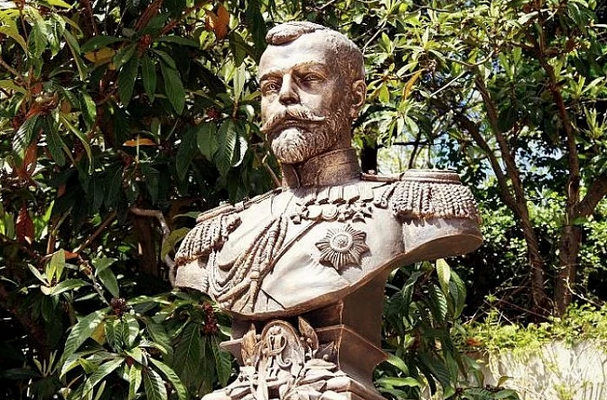 A row has erupted in northern Kazakhstan over the erection of a monument to Russian Tsar Nicholas II, who is reviled by many Kazakhs for his association with the bloody suppression of an uprising in 1916.
A row has erupted in northern Kazakhstan over the erection of a monument to Russian Tsar Nicholas II, who is reviled by many Kazakhs for his association with the bloody suppression of an uprising in 1916.
The bust to Tsar Nicholas II, who was murdered by the Bolsheviks following the 1917 Russian Revolution, was put up by local businessman Pyotr Vanger outside a church in the village of Arkhangelskoye, just south of the border with Russia.
On August 10, the statue was moved inside the village’s Russian Orthodox church following an outcry on social media about a monument revering somebody perceived as a Russian despot appearing in public.
“The monument has been taken inside, into the church,” Tengri News quoted local authorities as saying. “The decision to take it inside was made by the entrepreneur himself, to avoid questions.”
The statue has so far avoided the fate of a monument to Soviet leader Josef Stalin in southern Kazakhstan which was torn down earlier this year after generating a similar controversy.
That statue was removed from its pedestal in May, after villagers had re-erected it following its toppling in a hurricane last summer.
Village authorities ruled that they had acted without planning permission. But the case had wider political connotations as many were enraged at the reverential treatment of a Soviet leader whose policies caused the death of millions of people in Kazakhstan and elsewhere in the Soviet Union.
Statues to Russian and Soviet despots are sensitive for Astana, which is eager to promote its own sovereignty without antagonizing its powerful neighbor and close ally Russia.
The specter of the conflict in Ukraine hangs heavy over these seemingly petty local polemics. Since the strife erupted in Ukraine, the Kremlin has aggressively asserted its right to intervene in foreign countries to protect the rights of Russian speakers abroad — creating a headache for former Soviet states inhabited by large numbers of ethnic Russians, like Kazakhstan.
Around 21 percent of Kazakhstan’s population are ethnic Russians. The bulk of that population lives along the 7,000-kilometer border with Russia. President Nursultan Nazarbayev’s administration has made a point of propounding inclusive ethnic policies. Nazarbayev has repeatedly been at pains to stress he will tolerate no ethnic or linguistic discrimination.
North Kazakhstan Region, where the row over the Nicholas II bust broke out, borders Russia and is one of only two regions in Kazakhstan where ethnic Russians outnumber Kazakhs.
Controversies periodically erupt over moves to rename the provincial capital Petropavlovsk, which was named in honor of two Christian saints by Russian settlers who founded a fort there in the 18th century.
The name has negative connotations of colonial rule for some Kazakhs, but periodic attempts to give the city a Kazakh name — which have been floated for at least seven years – have been stiffly resisted by the city’s majority Russian inhabitants.
Supporters of a name change say the city – called Petropavl in Kazakh – should be given the name that nomadic Kazakhs who roamed the region before the Russian settlers arrived used for the area: Kyzylzhar, or “red cliff.”
EurasiaNet.Org, August 11, 2015




